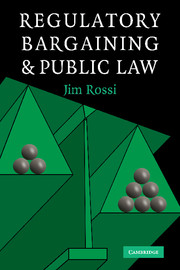Book contents
- Frontmatter
- Contents
- Preface
- Acknowledgments
- 1 The Scope of Regulatory Bargaining
- PART I EXTENDING INCOMPLETE BARGAINS FROM THE ECONOMICS OF THE FIRM TO PUBLIC GOVERNANCE
- 2 Regulatory Bargaining and the Stability of Natural Monopoly Regulation
- 3 The Incompleteness of Regulatory Law: Moving Beyond the “Small World” of Natural Monopoly Regulation
- 4 Refin(anc)ing Retail Service Obligations for the Competitive Environment
- PART II INCOMPLETE REGULATORY BARGAINS, INSTITUTIONS, AND THE ROLE OF JUDICIAL REVIEW IN DEREGULATED INDUSTRIES
- References
- Index of Primary Legal Authorities
- Subject Index
3 - The Incompleteness of Regulatory Law: Moving Beyond the “Small World” of Natural Monopoly Regulation
Published online by Cambridge University Press: 11 July 2009
- Frontmatter
- Contents
- Preface
- Acknowledgments
- 1 The Scope of Regulatory Bargaining
- PART I EXTENDING INCOMPLETE BARGAINS FROM THE ECONOMICS OF THE FIRM TO PUBLIC GOVERNANCE
- 2 Regulatory Bargaining and the Stability of Natural Monopoly Regulation
- 3 The Incompleteness of Regulatory Law: Moving Beyond the “Small World” of Natural Monopoly Regulation
- 4 Refin(anc)ing Retail Service Obligations for the Competitive Environment
- PART II INCOMPLETE REGULATORY BARGAINS, INSTITUTIONS, AND THE ROLE OF JUDICIAL REVIEW IN DEREGULATED INDUSTRIES
- References
- Index of Primary Legal Authorities
- Subject Index
Summary
In addition to explaining the traditional utility firm's vertically integrated organization and the stability of legal order in the natural monopoly regime, a government relations bargaining perspective provides important insights for the process of enactment and reform of regulatory law. Specifically, a bargaining approach provides a fruitful way of understanding many of the interactions between firms and governmental bodies, as well as among governmental bodies, in the political and legal process. It also presents a fresh way of understanding the demand for public law against the backdrop of deregulation and other legal transitions.
The bargaining approach to public governance issues is hardly novel and is certainly not foreign to law, economics, or political science. Gómez-Ibáñez (2003) advances the application of incomplete contracts to regulated industries by focusing on the conditions under which private contracting will fail and emphasizing the relationship between monopoly regulation and procurement contracting. His analysis, attentive to the general public/private institutional question, suggests that there will be a need for discretionary government regulation, often by an administrative agency, where private contracting fails. Even where an institutional approach of discretionary governmental regulation is chosen, however, bargaining retains relevance as a conceptual tool in understanding the regulatory process and its relationship to legal doctrine.
The relevance of contractual bargaining for the regulatory process has been explored by economists and political scientists, and increasingly by legal scholars.
- Type
- Chapter
- Information
- Regulatory Bargaining and Public Law , pp. 51 - 70Publisher: Cambridge University PressPrint publication year: 2005



